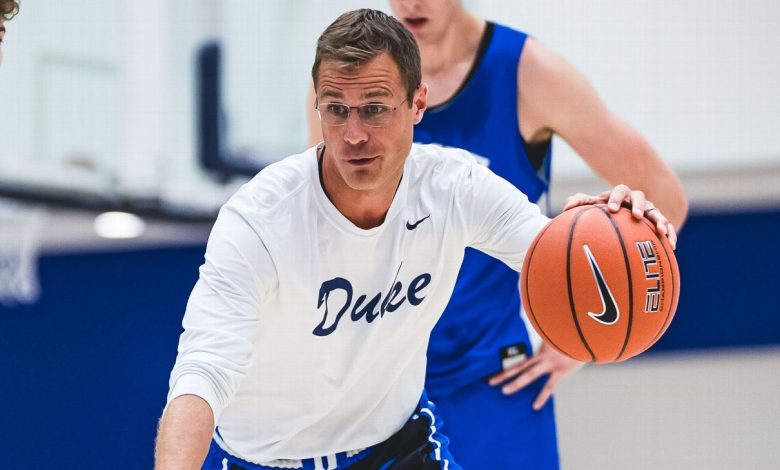Jon Scheyer’s arrival as the head coach of the Duke University men’s basketball team marked a new era for the storied program. The Blue Devils, under the leadership of Coach Mike Krzyzewski for over four decades, were accustomed to a winning tradition that defined the landscape of college basketball. However, as Krzyzewski stepped down in 2022, the challenge of maintaining the legacy of one of the sport’s greatest coaching dynasties fell into the capable hands of Scheyer, a former Duke player and long-time assistant coach.
Since taking the reins, Jon Scheyer has brought a fresh approach to the Blue Devils, blending the traditions that made Duke a powerhouse with modern basketball techniques, an emphasis on adaptability, and a commitment to building a deep roster. These changes are setting Duke up for sustained success in the ever-evolving landscape of college basketball. This article delves into how Jon Scheyer has transformed Duke basketball, creating a culture of depth, adaptability, and contemporary techniques that position the Blue Devils for future greatness.
A New Era at Duke
Jon Scheyer, a former Duke star, became the 20th head coach in Duke basketball history following Mike Krzyzewski’s retirement in 2022. As a player, Scheyer was part of some of Duke’s most successful teams, including the 2010 national championship-winning squad. His transition from a player to an assistant coach under Coach K provided Scheyer with an intimate understanding of the Duke system and its enduring philosophy of excellence, discipline, and high standards. However, his journey as a coach revealed his own philosophy, one rooted in innovation and modernization of the game, while still respecting the traditions that have made Duke a top-tier program.
Scheyer’s decision to infuse new strategies into the program has already paid dividends. One of the key elements that has distinguished his coaching tenure so far is his ability to strike the perfect balance between honoring Duke’s legacy and embracing contemporary basketball strategies. This fusion of old and new has made the Blue Devils more versatile and dangerous, with an eye toward sustained success in the future.
Building a Deep Roster: Depth Over Star Power
One of the primary changes Scheyer has implemented at Duke is a shift in roster construction. Under Coach K, Duke was known for bringing in top-tier recruits, many of whom were expected to make an immediate impact as one-and-done players. While this model worked in the past, Scheyer has opted for a more balanced approach by prioritizing depth and the development of players who may not fit the mold of the traditional NBA-bound, star recruit.
Rather than solely relying on a few superstar players to carry the team, Scheyer has made it a point to build a deep roster where each player contributes to the team’s success. This approach allows for better rotations, less reliance on individual brilliance, and greater team cohesion. Scheyer has demonstrated an ability to scout and recruit a wide range of talent, from high-profile recruits to players who may be overlooked by other programs. His understanding of the evolving trends in college basketball has allowed him to adapt Duke’s recruiting strategy to not only fill key positions but also to develop a stable of versatile players.
This depth can be seen in the playstyle of his teams. Unlike teams in the past that relied on the dominance of one or two players, Scheyer’s Blue Devils have benefited from having multiple scoring options, playmakers, and defenders. This makes them more unpredictable, harder to scout against, and more difficult to defend.
Adaptability: Embracing Versatility and Innovation
The landscape of college basketball is constantly evolving. With new trends, styles of play, and shifting recruiting priorities, programs must evolve to remain competitive. Scheyer has recognized that adaptability is key to staying ahead of the curve. Under his leadership, Duke has become a more versatile team, capable of adjusting to different styles of play, opponents, and game situations.
One of the most significant ways Scheyer has made his mark on Duke basketball is by embracing a more modern style of play that incorporates advanced analytics, positionless basketball, and faster pace. In contrast to the traditional, methodical half-court offense that characterized some of the past Duke teams, Scheyer’s teams have exhibited a faster tempo, higher ball movement, and more emphasis on spacing the floor. This allows for a more fluid offense that forces defenses to work harder and creates opportunities for Duke to exploit mismatches.
In particular, Scheyer has recognized the importance of a versatile, multi-dimensional lineup. By emphasizing a more fluid, positionless approach to basketball, Duke is now a team that can attack in a variety of ways. This adaptability allows Scheyer’s team to switch defensive assignments seamlessly, create more open shots, and defend the perimeter with greater efficiency. For example, Scheyer’s teams are now more likely to play small-ball lineups, bringing in players who are capable of shooting from outside while also holding their own defensively in the paint.
This shift towards adaptability is also seen in the way Scheyer handles the personnel and game strategy. In close games, he is not afraid to adjust his rotation, experiment with different player combinations, or make quick tactical changes in response to how the game is unfolding. This tactical flexibility has helped Duke become a more resilient team, capable of adapting on the fly, whether on offense or defense.
Modernizing Offensive and Defensive Techniques
In addition to adapting to the modern era of basketball, Scheyer has introduced new offensive and defensive techniques that align with contemporary trends in the sport. On offense, he has increasingly integrated three-point shooting as a key component of Duke’s attack. Historically, Duke teams were known for their strong inside play and mid-range jumpers, but Scheyer has emphasized a perimeter-oriented attack that stretches defenses and opens up driving lanes for his players.
Scheyer’s offensive sets now frequently revolve around ball screens, high-picking rolls, and spacing to create driving lanes. His approach prioritizes moving the ball quickly, finding the open shooter, and ensuring that players are not just standing still in the half-court offense but are actively engaged in creating space for one another. As a result, Duke is not just a team that can pound the ball inside, but one that can consistently shoot from deep, making it difficult for opponents to focus solely on defending the paint.
On the defensive end, Scheyer has implemented a defense-first mindset but with an emphasis on flexibility and aggression. While Duke’s traditional man-to-man defense remains a staple, Scheyer has incorporated more zone looks, particularly against teams with powerful inside players or when looking to disrupt opposing offenses. He has also incorporated greater pressure defense, particularly in the backcourt, forcing turnovers and creating fast-break opportunities. This aggressive style helps to keep opposing teams off balance, forcing them into mistakes while allowing Duke to capitalize on transition opportunities.
Furthermore, Scheyer has made sure that his players understand the value of analytics in both offensive and defensive decision-making. By employing a more data-driven approach to shot selection, player efficiency, and defensive matchups, Duke’s performance has become more optimized, maximizing strengths while addressing potential weaknesses.
Developing Player Relationships and Improving Player Development
A hallmark of Jon Scheyer’s coaching philosophy is his emphasis on player development. Recognizing that college basketball is a developmental league, especially with the increasing number of players who enter and leave programs quickly, Scheyer has focused on not only recruiting high-level talent but also fostering growth within his players during their time at Duke.
Scheyer’s focus on building strong relationships with his players has played a critical role in this development. He has shown an ability to connect with players on a personal level, making them feel valued, while pushing them to improve both on and off the court. Whether it’s helping a freshman acclimate to the rigorous demands of college basketball or refining a senior’s game to prepare for a professional career, Scheyer has placed great importance on helping players reach their full potential.
Scheyer has also fostered an environment in which players are encouraged to make adjustments, learn from their mistakes, and grow through adversity. He has brought in top-tier development staff and implemented individualized training regimens to ensure that his players are improving continuously. This philosophy of growth and development has helped Duke maintain a pipeline of NBA-caliber talent while also ensuring that players are equipped for success at the college level.
Setting Duke Up for Success in the Future
Jon Scheyer’s approach has already paid early dividends for Duke. His ability to blend traditional values with contemporary coaching techniques, his focus on creating depth and versatility within the roster, and his emphasis on adaptability and modernized basketball tactics have made the Blue Devils a potent force in college basketball. But perhaps the most important thing Scheyer has done is to set the program up for long-term success.
Duke, under his leadership, is not just about succeeding in the present but ensuring that the program remains competitive in the coming years. Through excellent recruiting, player development, and tactical innovation, Scheyer is laying the foundation for sustained success that will keep Duke among the elite programs in college basketball for years to come.
In the fast-paced, ever-changing world of college basketball, Jon Scheyer has proved that he can adapt, evolve, and innovate to keep Duke at the forefront of the sport. His ability to lead with vision, build a deep and adaptable team, and utilize contemporary coaching techniques has set the Blue Devils on a path that will ensure they continue to dominate in the years to come. With Scheyer at the helm, the future of Duke basketball is brighter than ever.



